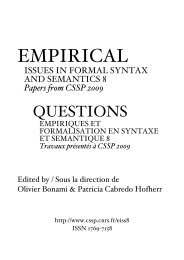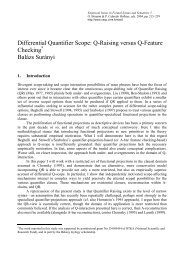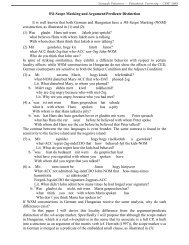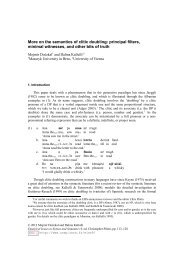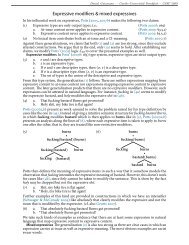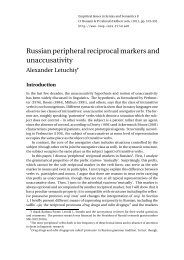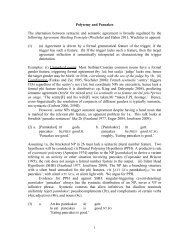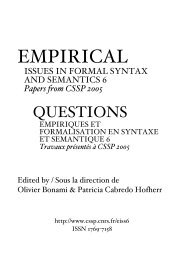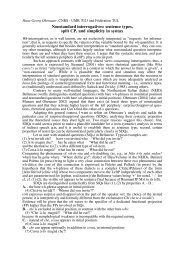Empirical Issues in Syntax and Semantics 9 (EISS 9 ... - CSSP - CNRS
Empirical Issues in Syntax and Semantics 9 (EISS 9 ... - CSSP - CNRS
Empirical Issues in Syntax and Semantics 9 (EISS 9 ... - CSSP - CNRS
Create successful ePaper yourself
Turn your PDF publications into a flip-book with our unique Google optimized e-Paper software.
(18) Scott <strong>and</strong> Ballantyne are not the only/sole authors of Waverley.<br />
Our lexical entry <strong>in</strong> (6) applied to the starred predicate *AUTHOR yields the follow<strong>in</strong>g.<br />
(19) ONLY(*AUTHOR)<br />
= λx : *AUTHOR(x) . ∀y[x ≠ y → ¬ *AUTHOR(y)]<br />
Let us represent Scott <strong>and</strong> Ballantyne as the sum <strong>in</strong>dividual S ⊕ B, <strong>and</strong> consider what happens<br />
when this function is applied to S ⊕ B. If Scott <strong>and</strong> Ballantyne are both authors, then<br />
the presupposition of ONLY(*AUTHOR) will be satisfied, <strong>and</strong> the function will yield true iff<br />
∀y[S ⊕ B ≠ y → ¬ *AUTHOR(y)]. But this is too strong. S ≠ S ⊕ B <strong>and</strong> *AUTHOR holds of S if it<br />
holds of S ⊕ B. The follow<strong>in</strong>g lexical entry solves that problem. 6<br />
(20) Proposed lexical entry for sole/only (generalized)<br />
ONLY = λP . λx : P(x) . ∀y[x ⊏ i y → ¬ *P(y)]<br />
Applied to *AUTHOR, (20) gives the follow<strong>in</strong>g: 7<br />
(21) ONLY(*AUTHOR) = λx : *AUTHOR(x) . ∀y[x ⊏ i y → ¬ *AUTHOR(y)]<br />
So if S ⊕ B satisfies ONLY(*AUTHOR), then it is not ruled out that S satisfies *AUTHOR; it is<br />
only ruled out that some larger sum, like S ⊕ B ⊕ M does. Notice the similarity with MAX_SORT;<br />
the only difference is that ONLY has a presupposition where MAX_SORT has an ord<strong>in</strong>ary at-issue<br />
condition.<br />
Before mov<strong>in</strong>g onto the plural case, let us make sure that we have not lost our solution to<br />
the problem for the s<strong>in</strong>gular case. (10) will now be exp<strong>and</strong>ed as follows.<br />
(22) ¬THE(ONLY(AUTHOR))(S)<br />
= ¬[[λP : |P| ≤ 1 . P](λx : AUTHOR(x) . ∀y[x ⊏ i y → ¬ *AUTHOR(y)])(S)]<br />
= ¬[∀y[S ⊏ i y → ¬ *AUTHOR(y)]] if |ONLY(AUTHOR)| ≤ 1 <strong>and</strong> AUTHOR(S);<br />
undef<strong>in</strong>ed otherwise<br />
Thus <strong>in</strong>deed, (2b) is still correctly predicted to presuppose that Scott is an author of Waverley<br />
<strong>and</strong> make an at-issue contribution that someone else is, too.<br />
2.4.3. Plurals, def<strong>in</strong>ites, <strong>and</strong> exclusives<br />
Now let us consider (17) <strong>and</strong> (18) with these lexical entries <strong>in</strong> h<strong>and</strong>. Plural def<strong>in</strong>ite descriptions<br />
with exclusives, as <strong>in</strong> these examples, are slightly different from s<strong>in</strong>gular ones, because<br />
when the nom<strong>in</strong>al is plural it is not the case that the property that the def<strong>in</strong>ite article comb<strong>in</strong>es<br />
with has an empty extension. For example, the property denoted by only authors denotes some<br />
6 This more complex variant is still a simplification of the lexical entry for only proposed by Coppock <strong>and</strong> Beaver<br />
(2011), accord<strong>in</strong>g to which, like its other exclusive brethren, it presupposes that P(x) is a lower bound on the true<br />
answers to the current question under discussion (CQ) <strong>and</strong> it asserts that P(x) is an upper bound on the true answers<br />
to the CQ. Under Coppock <strong>and</strong> Beaver’s (2011) analysis, adjectival only requires the CQ to be ‘What th<strong>in</strong>gs are<br />
*P?’ with answers ranked <strong>in</strong> a way that corresponds to a boolean lattice of <strong>in</strong>dividuals. For example, ‘*P(a ⊕ b)’<br />
is a stronger answer than ‘*P(a)’. Here we have omitted any reference to the CQ, as it only serves to br<strong>in</strong>g out the<br />
parallels between adjectival only <strong>and</strong> other exclusives.<br />
7 We have reduced **AUTHOR to *AUTHOR because **P = *P for all P. The cumulativity operator is closed<br />
under sum formation, so the extension of **P cannot conta<strong>in</strong> any elements that are not already <strong>in</strong> the extension of<br />
*P.<br />
65



